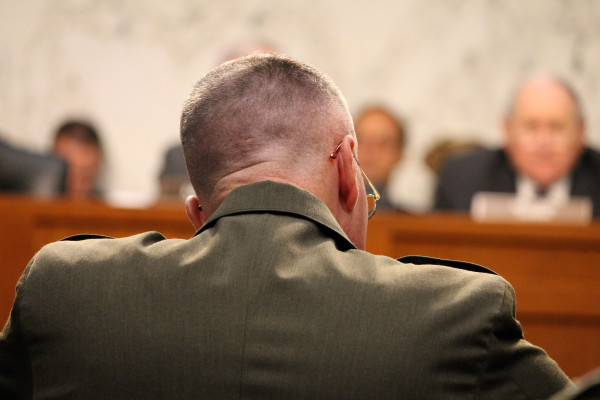(Video by Mariam Khan/Medill News Service)
Story by Jennifer-Leigh Oprihory, Medill News Service
WASHINGTON — The top priority of U.S. military operations in Afghanistan is to help the Afghan National Security Forces become sustainable and sovereign, Gen. Joseph F. Dunford, commander of U.S. Forces-Afghanistan, told the Senate Armed Services Committee on Tuesday.
The hearing marked his first appearance before the committee since Dunford was appointed head of U.S. and coalition forces in Afghanistan in February.
“We’re now focused on improving the quality of the ANSF,” Dunford said.
Dunford’s written testimony focused on shifting U.S. and coalition forces out of combat roles while providing “training, advising, and key combat support from ISAF, including close air support, logistics, and intelligence through the end of the ISAF combat mission in December 2014.”
He identified “key elements” of what a U.S. victory in Afghanistan would look like: Running of Afghan security by an independent and viable ANSF, an “operationally ineffective” al-Qaida lacking a place to hide, a government resulting from free and fair elections and “a constructive ANSF-Pakistan military relationship.”
Committee chair Sen. Carl Levin, D-Mich., asked Dunford what losing would look like.
“I think losing … would look like Afghanistan devolving, Afghanistan returning to the chaos, Afghanistan being a sanctuary for al-Qaeda, the people of Afghanistan once again being subjected to the oppression of the Taliban of the 1990s, a sanctuary from which security and stability of Pakistan can be threatened,” Dunford said.
The ultimate outcome in Afghanistan, he said, will be contingent on what the Afghans do going forward.
“It’s up to the Afghans to seize the opportunity that we provided them,” Dunford said.
He also told the committee that he supported President Barack Obama’s decision to draw down 34,000 of the 66,000 troops stationed in Afghanistan.
“What’s critical about the drawdown this year is that it allows us to stay engaged at the battalion … level with the Afghan security forces during their first summer to lead and we have the flexibility to conduct a draw down to allow us to stay engaged with our train, advise and assist level at the appropriate level this summer,” Dunford said.

